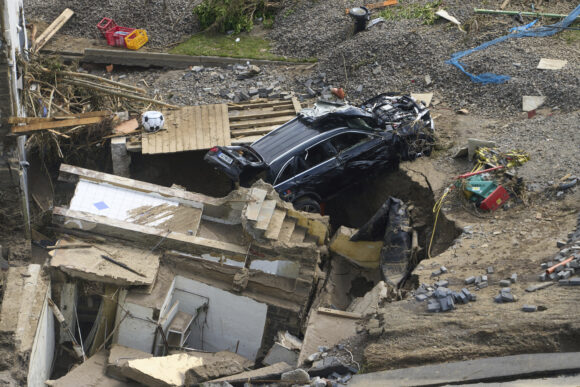The most significant non-U.S. loss event in 2021 was the mid-July flooding in Western Europe, according to CRESTA, the Zurich-based insurance industry organization that provides a global standard for risk aggregation zones and catastrophe industry losses.
This event generated a total industry loss of US$12.0 billion, up from US$11.0 billion in the first estimate released by CRESTA three months ago. CRESTA noted that the figure of US$12.0 billion does not include insurance losses funded by the regional governments in Belgium which amount to a total of US$1.2 billion.
These estimates are released as part of the CRESTA Industry Loss Index (CLIX), issued quarterly. CLIX provides industry loss data on international catastrophe events (excluding the U.S.), which have generated industry losses in excess of US$1 billion.
Other major international catastrophes in 2021 included the heavy snowfall event in Japan in January, the Fukushima Earthquake in Japan in February, severe convective storms in Europe in June, floods in China’s Henan province in July, the heavy rainfall event in Japan in August, severe storms in southern Australia in October, floods in British Columbia in November, and most recently Typhoon Rai in the Philippines and floods in Malaysia.
Out of these events, the Fukushima earthquake, the June storms in Europe and the Henan floods in China have each exceeded US$1 billion in losses, generating a total loss of US$9.6 billion for the insurance industry.
While the number of international cat events exceeding US$1 billion industry loss in 2021 is not unusual, said Cresta, the accumulated loss of US$21.6 billion is above the long-term average of US$13.7 billion (US$17.2 billion corrected for as-if-today).
Further, most of these losses were driven by extreme precipitation events during the summer months, generating huge masses of water within comparatively short time periods, Cresta continued.
Such events could become more frequent, driven by higher temperatures and increased water-holding capacity in the atmosphere, as well as the use of impenetrable surface materials as part of urban development and infrastructure construction which prevent water drainage into the soil, the organization noted.
“With the ever-changing risk landscape driven by a changing climate and growth in insured assets, understanding the past is a key part of detecting trends in the frequency and severity of major natural catastrophe events,” commented Matthias Saenger, technical manager of CLIX.
“CRESTA CLIX provides a consistent and coherent industry loss history which can be used for this purpose, and we are delighted to see the growing adoption of CLIX by the insurance and reinsurance market,” he added.
Access to CRESTA’s CLIX database is via subscription. CLIX data for the year 2018 are available to the public and can be accessed directly at clix.cresta.org.
About CRESTA and CLIX
The CRESTA organization was established by the insurance and reinsurance industry in 1977 as an independent body for the technical management of natural catastrophe insurance. Its manager is PERILS CRESTA AG, a subsidiary of Zurich-based PERILS AG.
CLIX is a service provided by CRESTA and offers benchmark information on natural catastrophe losses incurred by the global insurance industry. The CLIX database provides key information for all major cat events since 2000. The geographic coverage of the database is global, excluding the U.S. CLIX industry losses are reviewed quarterly up to a maximum of three years after the event.
Source: CRESTA
Photograph: Houses and cars in the Ahr valley in the Walporzheim district are destroyed in Bad Neuenahr-Ahrweiler, Germany, on Saturday, July 17, 2021. Days of heavy rain in Western Europe turned normally minor rivers and streets into raging torrents and caused the disastrous flooding that swept away cars, engulfed homes and trapped residents. Photo credit: Thomas Frey/dpa via AP.
Related:
German, Chinese Insurers Face Record Disaster Claims as Extreme Weather Intensifies
Was this article valuable?
Here are more articles you may enjoy.



 High Court: E-Scooter Rider Hit by Car Not Eligible for No-Fault PIP Benefits
High Court: E-Scooter Rider Hit by Car Not Eligible for No-Fault PIP Benefits  15 Californians Charged in Complex Auto Insurance Fraud Ring
15 Californians Charged in Complex Auto Insurance Fraud Ring  Update: Fannie Mae Guidelines Raise Concerns, Could Bar ACV Coverage for Homes
Update: Fannie Mae Guidelines Raise Concerns, Could Bar ACV Coverage for Homes  Santander Flags Data Breach Hitting Some Clients, All Staff
Santander Flags Data Breach Hitting Some Clients, All Staff 

